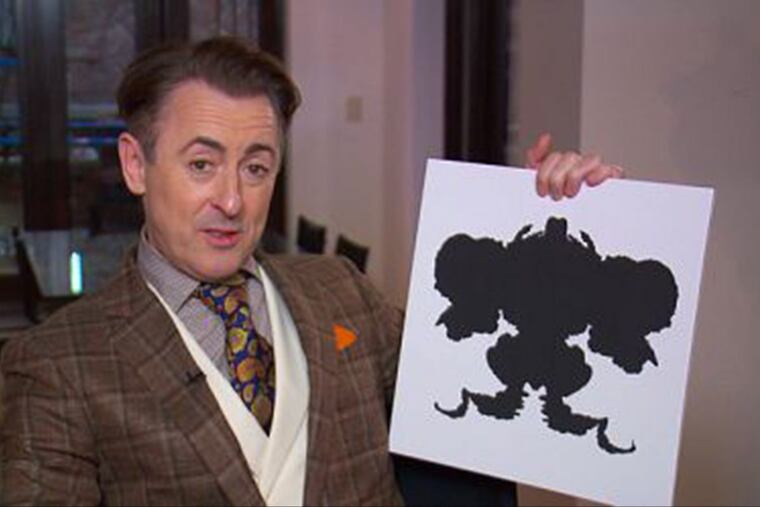Alan Cumming: My career thrives because of my activism, not in spite of it
Alan Cumming talks about his new series 'Instinct,' his new movie 'After Louie,' and his life as an LGBTQ actor and activist.

Alan Cumming said most Americans have two reactions to his precedent-setting TV show Instinct — pleased that a major network has finally made a drama whose lead character is gay, and "appalled" that it's taken so long.
"Folks are appalled because they honestly can't believe it's never happened before," said Cumming, who'll be in town Sunday to accept the Artistic Achievement Award in Acting at the qFLIX Philadelphia — an LGBTQ+ film festival — where his movie After Louie will be the closing-night feature, also Sunday, at 8 p.m. at the Perelman Theater at the Kimmel Center for the Performing Arts.
Cumming is executive producer of the groundbreaking CBS show and worked closely with the creative team to shape his character, Dylan Reinhart, a retired spy, university professor, and sleuth who assists an NYPD detective in ongoing investigations.
"I'm proud of the show, proud of the fact that [my character's] sexuality is way down the list of the things you know about him," Cumming said of Reinhart, who is married in the show to another man, presented evenhandedly as one trait in a long roster of attributes. Cumming has said his quirky character, for instance, may be somewhere on the spectrum, and plays him that way.
"I think it's important, when you have an audience of millions of people, to show two men in a marriage the way marriage is — most of the time, it's just two people chatting," said Cumming, who is married to illustrator Grant Shaffer.
Reinhart's marriage is incidental to the drama, he said, but potentially important to the culture. Cumming is a believer that disarming, mainstream shows like Instinct can "change things." That's always been a motivating factor to Cumming, an actor who's been fearlessly open about his sexuality and has raised money for organizations including the American Foundation for AIDS Research, the Gay & Lesbian Alliance Against Defamation, and the Human Rights Campaign. He's been an advocate for gay marriage, for an independent Scotland, and against circumcision.
Many actors fear their careers will suffer if they are open about their sexuality. Cumming says his own has thrived because of it.
"I think actors, especially in America, are overly cautious expressing themselves honestly, in a variety of ways," he said. "And there's a danger in that. It makes you generic and bland. The fact that you speak out, that you are willing to say things, to use your voice, I think it gives you an identity. I've benefited from that."
At the same time, Cumming, who now calls New York home and is a U.S. citizen, says things are changing. Major gains by Republicans in national elections, he said, have roused LGBTQ activists from complacency.
"I think people are suddenly way more politically engaged," he said. "It's awful to have to get into such dire straits for that to happen, but in a way, that's a part of the system here."
As a native of the U.K., where parliamentary structure means that the out-of-power party still has vocal and clearly defined party leadership, Cumming said Americans don't seem to know what to do with themselves between presidential elections.
"The parties are like sports teams. If the other team wins, you sit out the next four years until you've got another match," he said.
That shadow of dormant activism is a theme in After Louie.
Cumming plays Sam Cooper, a painter whose career declined after he lost friends and lovers to the AIDS epidemic. He's dithering with a film project about the crisis and pursuing a relationship with a much younger man who's mostly clueless about the sacrifices made by Cooper's (and Cumming's) generation.
"When I read this script, my reaction was, Wow, I know these people so well. I know this schism between the older and a younger generation of gay men. And I understand both points of view," he said. Cumming empathizes with the older men of the ACT UP era who lost so much and yet accomplished so much, and the young people who say, "Stop blaming me for not having been there. … You fought for my rights, thank you, and now let me enjoy the fact that I have them."
He said the film also gets to more abstract ideas and emotions.
"I don't think I've seen another movie touch on this — the idea that there's this whole generation of gay men missing, who could have been mentors, who could have guided people and explained so many things. And something else — I think there is a massive amount of PTSD related to the horrors of that age," said Cumming. Some characters in After Louie, he said, show the residue of that. "People who survived still have not quite processed all of it."
Cumming said he made himself "look old" for the part, growing out a salt-and-pepper beard, putting on a few pounds.
It gives him an added gravitas, which led me to suggest that Cumming, 53, who's played Hamlet and Macbeth on stage, might now be ready for Lear.
He laughed.
"That's funny. People always ask me what part I most want to play, and I never have an answer. So I've said Lear, because it's so far away in the future I know I never actually have to worry about it. Now, I guess it's not so far away."